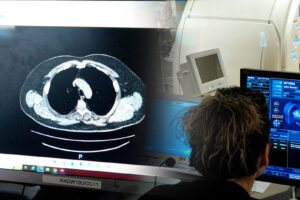In college athletes, COVID-19 has been linked to myocarditis, a potentially dangerous kind of heart inflammation.
Published 11/30/21 on Brinkwire
BY ROBERTO SILMAN ON NOVEMBER 29, 2021HEALTH
In college athletes, COVID-19 has been linked to myocarditis, a potentially dangerous kind of heart inflammation.
According to a study presented today (November 29, 2021) at the annual meeting of the Radiological Society of North America, a small but considerable number of collegiate athletes will develop myocarditis, a potentially hazardous inflammation of the heart muscle that can only be seen on cardiac MRI (RSNA).
Myocarditis, which is usually caused by a bacterial or viral infection, can disrupt the heart’s rhythm and capacity to pump blood, as well as cause long-term damage to the heart muscle in the form of scarring. It’s been connected to up to 20% of all sudden deaths among young athletes. Concerns about an increased frequency of COVID-19 among student-athletes arose as a result of the COVID-19 pandemic.
Clinicians from schools in the highly competitive Big Ten sports conference worked on the new study to gather information on the occurrence of myocarditis in student-athletes recovering from COVID-19 infection. All athletes with COVID-19 were compelled by conference officials to undergo a series of cardiac tests before returning to play, giving researchers with a unique opportunity to collect data on the athletes’ heart health.
The Big Ten Cardiac Registry’s cardiac MRI core leader is Jean Jeudy, M.D., a professor and radiologist at the University of Maryland School of Medicine in Baltimore. This registry oversees the collecting of all data from the Big Ten conference’s member schools.
Dr. Jeudy looked at the results of 1,597 cardiac MRI exams from the 13 schools that took part in the study. There was no selection bias for cardiac MRI because all COVID-positive athletes completed a full battery of cardiac tests, including cardiac MRI, echocardiography, ECG, and blood tests, as well as a thorough medical history.
COVID-19 myocarditis was detected in 37 of the athletes, or 2.3 percent, which is comparable to the rate of myocarditis in the general population. However, a startlingly high percentage of myocarditis cases were discovered in athletes who had no clinical symptoms. Twenty of the COVID-19 myocarditis patients (54%) exhibited neither cardiac symptoms nor abnormal cardiac tests. Only a cardiac MRI revealed the issue.
“Testing patients for clinical signs of myocarditis only captured a small percentage of all cardiac inflammation patients,” Dr. Jeudy explained. “For all athletes, cardiac MRI provided a 7.4-fold increase in detection.” The consequences of myocardial damage revealed by cardiac MRI after COVID-19 are still unknown.
“The fundamental issue… Summary of Brinkwire News.



